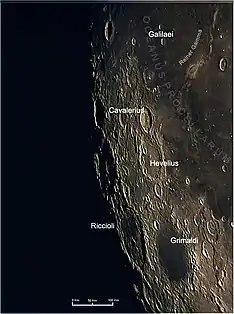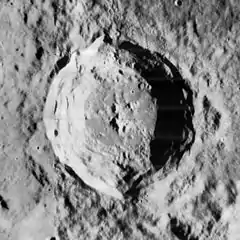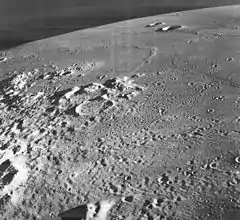Cavalerius (crater)
Cavalerius is a prominent lunar impact crater that lies on the western edge of the Oceanus Procellarum lunar mare on the west part of the visible Moon. It nearly joins the northern rim of Hevelius to the south.

 Mosaic of Lunar Orbiter 4 images | |
| Coordinates | 5.1°N 66.8°W |
|---|---|
| Diameter | 58 km |
| Depth | 3.0 km |
| Colongitude | 67° at sunrise |
| Eponym | Buonaventura Cavalieri |

The rim of Cavalerius is relatively high, rising to over 3 kilometers in places. There are clefts in the northern and southern parts of the rim and inner walls. Parts of the inner sides are terraced. The interior floor has mixed low hills and level areas. In the midpoint of the crater floor is a low central peak, with neighboring ridges to the north and east.
Northeast of this crater is the site designated Planitia Descensus, the landing site of the Soviet Luna 9 probe, the first vehicle to soft-land on the Moon. It lies among some low ridges along the edge of the Oceanus Procellarum.
Satellite craters
By convention these features are identified on lunar maps by placing the letter on the side of the crater midpoint that is closest to Cavalerius.
| Cavalerius | Latitude | Longitude | Diameter |
|---|---|---|---|
| A | 4.5° N | 69.5° W | 14 km |
| B | 6.0° N | 71.0° W | 39 km |
| C | 5.8° N | 69.2° W | 8 km |
| D | 8.6° N | 68.3° W | 52 km |
| E | 7.7° N | 69.9° W | 9 km |
| F | 8.1° N | 65.3° W | 7 km |
| K | 10.3° N | 69.2° W | 10 km |
| L | 10.4° N | 70.2° W | 10 km |
| M | 10.3° N | 71.5° W | 12 km |
| U | 10.1° N | 67.4° W | 7 km |
| W | 6.9° N | 67.3° W | 7 km |
| X | 9.2° N | 66.6° W | 4 km |
| Y | 10.7° N | 69.8° W | 7 km |
| Z | 11.0° N | 69.5° W | 4 km |
References
- Andersson, L. E.; Whitaker, E. A. (1982). NASA Catalogue of Lunar Nomenclature. NASA RP-1097.
- Blue, Jennifer (July 25, 2007). "Gazetteer of Planetary Nomenclature". USGS. Retrieved 2007-08-05.
- Bussey, B.; Spudis, P. (2004). The Clementine Atlas of the Moon. New York: Cambridge University Press. ISBN 978-0-521-81528-4.
- Cocks, Elijah E.; Cocks, Josiah C. (1995). Who's Who on the Moon: A Biographical Dictionary of Lunar Nomenclature. Tudor Publishers. ISBN 978-0-936389-27-1.
- McDowell, Jonathan (July 15, 2007). "Lunar Nomenclature". Jonathan's Space Report. Retrieved 2007-10-24.
- Menzel, D. H.; Minnaert, M.; Levin, B.; Dollfus, A.; Bell, B. (1971). "Report on Lunar Nomenclature by the Working Group of Commission 17 of the IAU". Space Science Reviews. 12 (2): 136–186. Bibcode:1971SSRv...12..136M. doi:10.1007/BF00171763. S2CID 122125855.
- Moore, Patrick (2001). On the Moon. Sterling Publishing Co. ISBN 978-0-304-35469-6.
- Price, Fred W. (1988). The Moon Observer's Handbook. Cambridge University Press. ISBN 978-0-521-33500-3.
- Rükl, Antonín (1990). Atlas of the Moon. Kalmbach Books. ISBN 978-0-913135-17-4.
- Webb, Rev. T. W. (1962). Celestial Objects for Common Telescopes (6th revised ed.). Dover. ISBN 978-0-486-20917-3.
- Whitaker, Ewen A. (1999). Mapping and Naming the Moon. Cambridge University Press. ISBN 978-0-521-62248-6.
- Wlasuk, Peter T. (2000). Observing the Moon. Springer. ISBN 978-1-85233-193-1.
